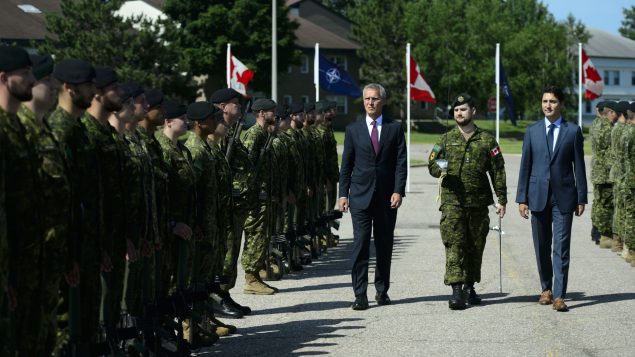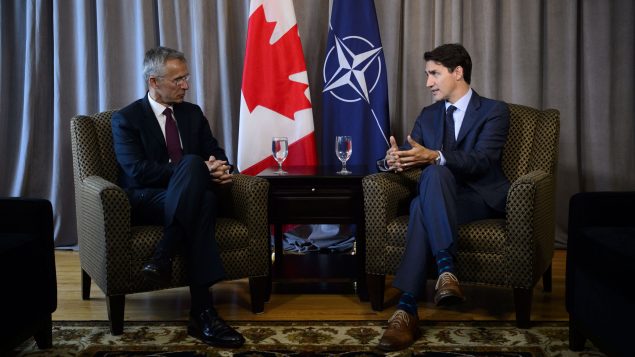While NATO allies have beefed up their cyber defences, the best guaranty of safeguarding Canada’s upcoming federal elections against possible Russian interference is the country’s free and independent press, the alliance’s Secretary General Jens Stoltenberg said Monday.
Speaking to reporters at a Canadian military base near Ottawa, Stoltenberg said NATO has created a centre of excellence in Estonia where in April it conducted the world’s largest cyber security exercise designed to not only learn how to protect the alliance’s cyber infrastructure but also safeguard against interference with democratic institutions.
- NATO could invoke collective defence if attacked in cyberspace, Stoltenberg warns
- NATO wants to keep the Arctic an area of low tensions, Stoltenberg
The best defence against Russian disinformation campaigns is having a free and independent press that can understand and uncover attempts to spread fake news, Stoltenberg said at a joint press conference with Prime Minister Justin Trudeau at the Canadian Forces Base in Petawawa.
“The best response to propaganda is not propaganda but the best response to propaganda is the truth, and free and independent press is an extremely important part of that,” he added.
Stoltenberg also praised Canada for boosting its defence spending, for its role in leading the NATO battle group in Latvia and the alliance’s non-combat mission in Iraq, which will be led by a female general for the first time.

Secretary General of the North Atlantic Treaty Organization (NATO) Jens Stoltenberg inspects the troops at Canadian Forces Base Petawawa, Ont. on Monday, July 15, 2019, as he is joined by Prime Minister Justin Trudeau. (Sean Kilpatrick/THE CANADIAN PRESS)
The Canadian Armed Forces (CAF) will continue commanding a NATO training mission in Iraq until November 2020 to help build sustainable defence and security institutions, the Liberal government announced in June. Canada was originally intended to end its leadership role in the non-combat advisory and training mission this fall.
Brig.-Gen. Jennie Carignan, who will be promoted to the rank of Major-General, becoming the highest ranking woman in combat arms trade, will take command of the mission from Maj.-Gen. Dany Fortin this autumn.
- Canada extends and boosts its contribution to NATO mission in Latvia
- Canada to head new NATO mission in Iraq
Canada and several other NATO nations are facing pressure from the Trump administration to increase defence spending to reach the goal of 2 per cent of defence expenditures as share of the GDP.
Trudeau said Canada has boosted its defence spending by nearly 70 per cent over the last four years.
Despite increases in defence spending by the Liberal government, Canada’s 2019 defence expenditures were projected to be about 1.27 per cent of its GDP, according to the latest statistics compiled by NATO.
Canada also falls significantly short of another key NATO yardstick when it comes to how much money from its defence budget goes to acquiring new equipment. In 2019, Canada was projected to spend 11.2 per cent of its defence budget on new equipment compared to the NATO goal of 20 per cent.







For reasons beyond our control, and for an undetermined period of time, our comment section is now closed. However, our social networks remain open to your contributions.